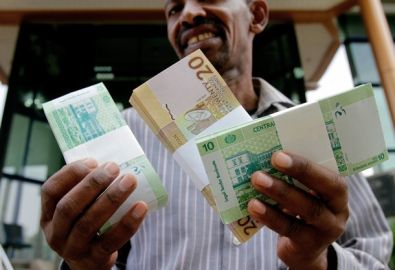Sudan devalues currency by 22.6%: report
November 11, 2013 (KHARTOUM) – The Central Bank of Sudan (CBoS) has quietly devalued its currency by 22.6% against the US dollar which is the second move of its kind since more than a year ago.

A CBoS official, asking not to be named, told Reuters the rate had been already changed in September when the government cut fuel subsides. He did not elaborate.
The official may be referring to the move by the Sudanese cabinet that month to raise the US dollar exchange rate for importing purposes to 5.7 pounds along with its decision to scale back fuel subsidies which almost doubled prices of gasoline and diesel.
In May of last year, CBoS allowed government-licensed Forex bureaus to determine their own rates in buying and selling currencies but within a certain range in an effort to curb the flourishing black market.
Sudan has been struggling to narrow the gap between the official and black market rates of foreign currency exchange which has been widening since the country lost its main source of hard currency revenues due to the secession of the oil-rich south in July 2011.
Prior to the country’s breakup, Sudan produced close to 500,000 barrels but now its output is limited to 140,000 barrels per day. Oil revenue constituted more than half of the Sudan’s revenue and 90% of its exports.
The Sudanese pound lost more than half its value against the US dollar in the black market and at one point reached 8.2 in last September compared to an official rate of 4.4.
The CBoS refuses to disclose the amount of Forex reserves it holds but a report released by the International Monetary Fund (IMF) this month shows it having $1.6 billion in 2013 which covers only 2 months of imports compared to $1.7 billion in 2012.
An IMF online survey published in 2011 argues that that a country must hold Forex reserves that cover 3 months of imports at a minimum.
The low level of reserves means that the government has little leverage to intervene in the market to bring down the exchange rate and cut demand in the black market.
Today’s devaluation also means that Sudan will pay more to import food which is vital to plug the deficiency in local food production. It also hurt businessmen and foreign companies that desperately seek to repatriate profits abroad.
This week, Zain, Kuwait’s No. 1 telecom operator, said that its Sudan unit saw a plunge in profit for the third quarter which it blamed on foreign exchange fluctuation.
(ST)

